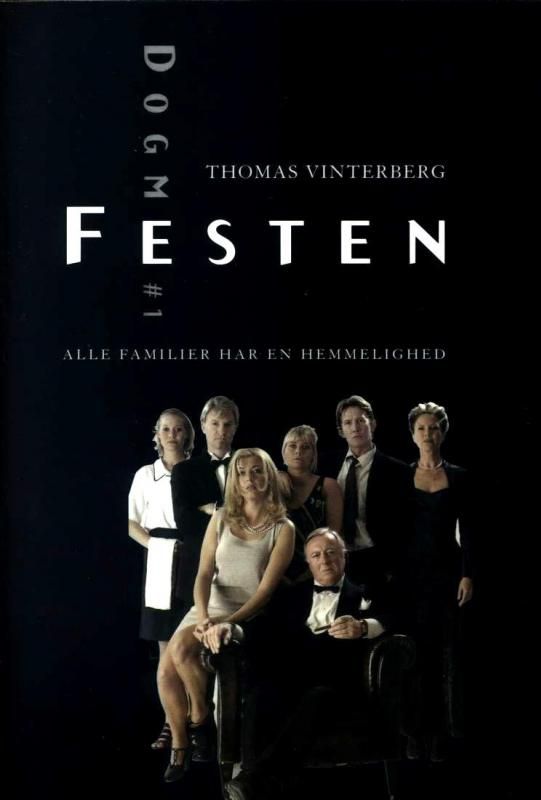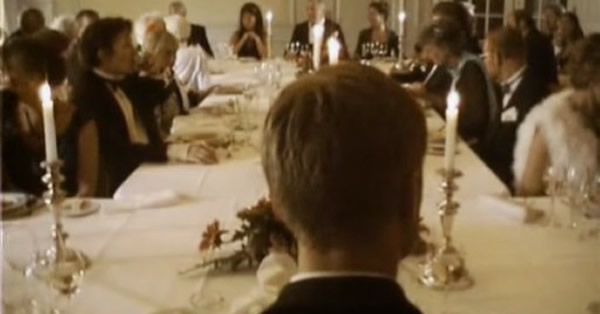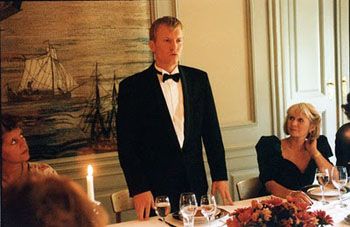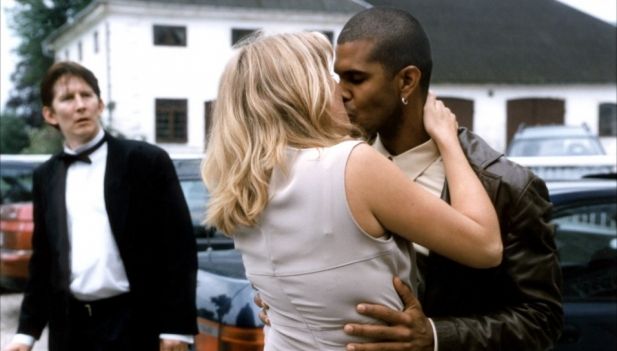The
Celebration
1998
Director: Thomas Vinterberg
Starring: Ulrich Thomsen, Henning
Moritzen, Thomas Bo Larsen, Paprika Steen
So. Yeah.
Watched this movie the other day.
It’s, um, it’s really good. And
powerful. And intense. And absorbing. So much so, it’s pretty much temporarily
robbed me of my ability to think coherently.
Christian
(Thomsen) is returning to his wealthy family’s estate to celebrate his father’s
(Moritzen) sixtieth birthday party, along with his slightly derelict brother (Larsen)
and his anthropologist sister (Steen) and the rest of the greater extended
family. There are signs of dysfunction
in the family from the get go, but everything starts to go to hell when, during
his toast to kick off the dinner, Christian drops a bombshell on the
family.
It’s
an incredibly simple premise, and the tale of family dysfunction has been
explored many times over in film both before and after The Celebration. But damn it all, The Celebration does it
so well, I forget that I’ve seen similar tales before. This is a film driven by script, by
characters, and by performances. The
filming techniques (more on that later) were incredibly simplistic, keeping the
focus squarely where it ought to be – on Christian and his family, on watching
them self-implode.
So
let’s consider these characters, then, given that they drive the film almost
entirely. We have Christian, his brother
Michael, and his sister Helene. Right
off the bat, Michael is presented as an utter dick. He kicks his wife and kids out of the car to
make room for Christian, making them walk in the hot sun while he drives to the
estate. He trash talks the concierge to
get his way. He makes allusions to being
in financial difficulties, and seems to be tripping all over himself to seize
opportunities to advance himself in society.
Then there’s Helene: when we meet her, she’s lighting up a joint while
bribing her taxi driver to drive way too fast on a crowded country road. She immediately starts fighting with Michael
as soon as she sees him. Michael and
Helene are loose cannons. Christian,
however, is quiet, controlled, and almost meek and subservient when called to
his father’s side before the dinner. He
runs a successful restaurant in Paris.
He’s the eldest son, the one who has all his ducks in a row. Essentially, the first half hour of the film
is solely focused on establishing these characters, getting to know them and
understand them.
It’s
hugely significant, then, that it is this sibling that does the
world-shattering that takes place in The Celebration. It is not the loudmouth Michael, or the
wildly emotional Helene. No, quiet,
conservative, stoic Christian detonates the bomb. In short, the last character you would
expect.
From
this point on, the rest of the film is about how everyone reacts to the
aforementioned bomb, and once more, it’s utterly fascinating watching this
because the film is written so well.
Christian and his family and friends are distinctly upper class; the father’s
estate is absolutely huge, and dinner is a very formal affair. Watching these upper class citizens react to
Christian’s news was both stomach-turning and pitch perfect at the same
time. These are precisely the sort of
people to ignore something that strikes them as distasteful, and I love that
that’s what happens. There are no
immediate cries of shock or anger; Christian’s audience tries to ignore him in
order to silence him, in order to forget what they just heard. It makes total sense, but it’s not a typical
reaction. Even Christian’s siblings and
parents hardly react by supporting him; watching Helene and Michael slowly wrap
their heads around Christian’s news is a great deal of the emotional arc of the
tale. The best reaction, however, is probably
that of Christian himself. I have never
seen news like Christian’s delivered with such utter dry stoicism. He says it, then acts as though he
didn’t. He battles with his family about
it, and his soft spoken nature that was hinted at earlier in the film threatens
to cause him to retract his statement.
It’s heartbreaking, watching Thomsen turn in this performance of a
haunted, quiet man trying desperately to find some strength. Christian seems destined to fold, but he has
unlikely friends and supporters, mostly the members of the staff at the estate,
who stand by his side and take steps to insist that Christian be heard.
All
that being said, however, there are a few little plot points that go nowhere
and feel wholly unnecessary to The Celebration. Why is there a hot female dinner guest
hitting on the waitress Pia? What
happens after all between Michael and the other waitress, Michelle? There is racial tension brought up between
Michael and Helene’s boyfriend, but we see it in two or three scenes and then
nothing. I absolutely understand that
life has many stories, and films with multiple tales can be very interesting,
but in a film as focused as this one, these minor asides detract rather than
enrich. This is a minor quibble,
however.
The
Celebration
is part of the Dogme95 school of film thought that was started in the 1990s by
Danish directors. They held to the
belief that film should be as realistic as possible; essentially, there should
be no artificiality and no post-production at all. All dialogue needs to be captured during the
scene, no additional lighting is allowed, no soundtrack other than music that
was filmed live in the scene, sets should be found places, zero sound effects
at all, and the camera should be as unobtrusive as possible – preferably
handheld. This concept of a total pared
down filming experience clearly limits the filmmaker; he himself confessed that
he “cheated” once in The Celebration because he put a
screen over a window in one scene – ooh, he disrupted the realism of the film! Probably owing to both the filming conditions
and an older DVD copy I borrowed from Netflix, the picture quality is a little
lacking. It’s fuzzy, it’s a bit blurry,
it’s a bit pixilated. The sound was a
big surprise for me. I have become so
accustomed to the sound effects associated with fight scenes that when
characters hit each other in The Celebration, I was
unnerved. Where was that distinct
*thunk* I have gotten used to? It wasn’t
there! Despite this extreme attention to
veracity, I give the director credit for some truly beautifully lit
scenes. Given that he insisted on
working entirely with natural lighting, he was clearly limited, and yet found a
way, even in very dark scenes, of illuminating the characters in an interesting
and artistic way. Dogme95, as a movement,
did not last, and I can see why. You’ve
got to have a damn fine script and damn fine performances in order to do
without any of the other trappings of traditional movies, and most films will
fall short. The Celebration doesn’t,
but it’s a rare film. A more commonplace
film would be brought down by this idea rather than elevated. Indeed,
for me, The Celebration succeeds in spite of its filming rather than
because of it. Once it started delving
into the meat of the family relationships, I forgot about its naturalism as it
no longer mattered; I was too wrapped up in the story to care how it was made.
The
story and the characters reminded me of two very distinct pieces of
entertainment as I was watching. First
of all, the idea of airing dirty family secrets at a wealthy family estate in
Denmark made me think of Stieg Larssen’s book The Girl with the Dragon
Tattoo. (I have not seen either film
version of this book, so I cannot draw comparisons there.) While Larssen’s book is a bit more on the
adventure/thriller side of the idea, the concept of being marooned in Northern
Europe, of being isolated, of being cut off from outside civilization with
nowhere to run from the familial problems at hand was very similar. This is a great compliment, as I really loved
that book. The next piece of entertainment
that I was reminded of is even more right on the nose, and that’s Ingmar
Bergman’s fantastic Through A Glass Darkly (1961), which is about a troubled
daughter spending a weekend with her husband, father, and brother in the
isolated Faro Islands, all while family secrets are dredged up. When I made this second connection, that’s
when The
Celebration suddenly clicked for me.
The Celebration is modern Bergman. It’s so Bergman, it’s painful in its
exquisiteness. And holy cow, but I love
Bergman. I have a feeling Ingmar Bergman
might not have approved of the filming techniques used in The Celebration, but he
would have been falling all over himself about the story and the emotional
intensity therein.
I
love the intensity of a good family parlor drama. I don’t mind that the scenes don’t vary much
in terms of sets; if I can become wholly emotionally invested in the deeply
traumatized characters on the screen, I’m in it for the long haul, and you can
have all the talking in the same dining room you want. The Celebration is gripping. It’s emotional and intense, but in a very
distinct way. It’s not pleasant, but
it’s not tortuous either. The emotion in
The
Celebration is that of catharsis.
You get to the other side feeling like you’ve been punched in the gut,
but in a good way, as odd as that sounds.
This is a film I wouldn’t mind rewatching once a year or so in order to
undergo Christian’s journey yet again.
It’s a horrible journey, but a wonderful one all the same.
Arbitrary
Rating: 9/10




I saw Festen in the cinema shortly after its release when Dogme95 was all the hype, but like you the filming techniques were soon forgotten. There are two currents going in the film, a surface current that is actually rather funny starting with the absolutely absurd scene where Thomas Bo Larsen kicks out his family to make room for his brother. The cinema laughs as it does in several scenes throughout the film. And then there is the deeper, bitter current, a horrible truth that has to be suppresed not to disturb the peace. But the masking becomes thinner and thinner until the cover-up becomes so thrill that that is also funny in it own pathetic way (The toastmaster suggesting a song to lighten the mood after the bomb has just exploded). It is very carthartic indeed. It is also very Danish and not limited to an upper class environment, but sort of the instinctive reaction. These people are seriously messed up by their horrible monster of a father and the lid have been on for so many years and now that it breaks nobody knows how to deal with it.
ReplyDeleteI have not seen this one in years but now I feel like watching it again. Happy you liked it.
One day, I'd love the chance to see this one in the theater for the reasons you mention - the little moments of humor along with the horrible main story line.
DeleteThis one is really, really good. The Celebration definitely stood out from the pack for me. GO WATCH IT AGAIN!